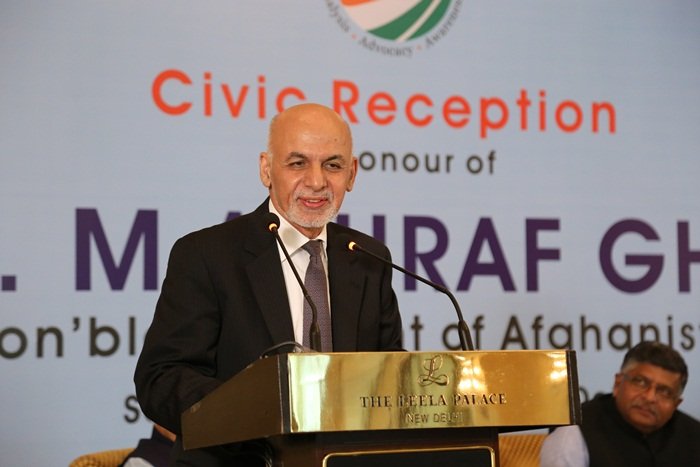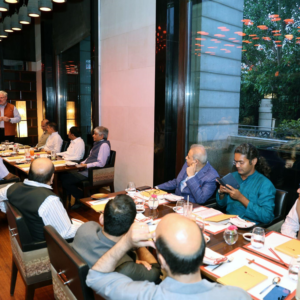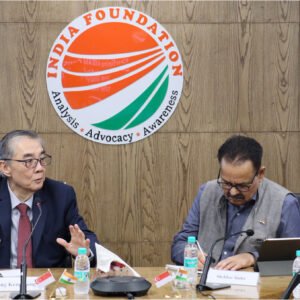First I would like to thank PM Modi, my friend, the friend of Afghanistan, for his steadfast attention to nurture this historic relationship. A billion ties will grow to billions more of hope in common understanding. I would like to thank the Indian people. The welcome that has been given to Afghans, the billion dollars that India committed to our country is an indication of the commitment of every Indian to the future of Afghanistan. I would also like to thank Indian businesses. In Mumbai last week the economic corridor resulted in 120 million dollars in contract and close to over 400 million dollars in MoUs. Indian business is very welcome and on Digital India and Digital Afghanistan, I would like to thank Dr. Qayoumi, former President of San Jose State University and currently Minister of Finance of Afghanistan for having created a very special relationship with Indian Institutes of Technology and Indian Institute of Business.
One result of what Mr. Ravi Shankar Prasad spoke (offering National Knowledge Network (NKN) programme, an initiative that will allow educational institutes in the war-torn country to connect using high-speed internet) is going to be at least 1,000 virtual labs for the remotest schools in Afghanistan. We have turned tech assistance by its head by agreeing to virtual courses where instead of hundreds, now tens of thousands of young Afghan men and women will take courses, will be intensely examined and in the end instead of spending 4 years, will come for two months to India and get joint certificates. This is the new India partnering with new Afghanistan and there are no limits to understand it. Equally with regard to industry and commerce and all related aspects, we would like India to consider Afghanistan as a platform for the global world. Like the air corridor, now to jump to territory, invest in Afghanistan to look towards Central Asia and beyond.
I would like to thank Indian educational institutes. Approximately 15,000 Afghans are studying here, forming deep relationships and friendships that are going to be enduring. Not only are our graduates from Indian institutes of higher learning now serving in Afghan cabinet, but they are working across the board. A young Afghan who wrote an MA thesis with 93% originality on water resources is now Deputy Minister of water and energy in Afghanistan. And ambassador has just given me a list of 100 Afghans who have topped in Indian Universities. As soon as I return I am going to invite them collectively and appoint them to positions across the board.
I would also like to thank Indian democratic institutions. What India and Afghanistan share is a deep and abiding trust in democratic institutions and the will of the people. I am here because I am the elected leader of Afghanistan speaking in the world’s largest democracy and forging relations between these two democratic nations. Dictatorship has no place in the future of Afghanistan as hopefully will not have violence. It’s a relationship that is a model of what we want to be in force in the region.
Today there are two contending views on the future of Afghanistan. What are these views? The first is what our relationship with India illustrates, that Afghanistan serves as a platform for regional and global cooperation.Toynbee coined a term for us, he called us a Roundabout, a place where ideas, people, goods flow, interact and inform each other. Throughout 2000 years, we were roundabout. The contrasting term he developed for our present was Cul-de-sac, where things get stuck, where walls are built and where exclusion is practiced. Afghanistan firmly believes in becoming the roundabout. Because of the contending view there is a war waged against us, making Afghanistan a stage for regional and global instability.
Let us understand what is at stake. Afghanistan by networks of violence, transnational terrorists and criminal networks, the only thing that is offered to us is blood, destruction and more destruction. We need to understand what is at stake today in Afghanistan. What is at stake is the stability of the region in the world. To deliver and realise on the wishes and aspirations of our people, the government of national unity is working relentlessly to ensure that we become an Asian roundabout and a platform for cooperation. Next year is going to be the 40th anniversary of the Soviet invasion of Afghanistan and also the 100th anniversary of our independence. When we gained our independence we were the only country in the region that had both stability and prospects of modernity. Unfortunately, the 20th century was extremely cruel to us. We intend to make the 21st century a century of success for us in the region.
Despite the fact that I am 69, I speak for the generation that is below 35. And I am proud that we have the youngest cabinet in the region. I also speak for the women of Afghanistan. We are extraordinarily proud of our ministers and ambassadors. But particularly proud of our women social activists. Afghan women no longer need voices of others to represent them. They can speak for themselves. And they speak clearly with compassion and conviction. And I salute the Afghan women for their extraordinary courage and determination. The Afghan women cannot be put in a cage again. No one can do that. They are very similar to their Indian sisters.
What’s the nature of the war that is being practiced on us? It is an unrestricted war. What does it mean to be subjected to an unrestricted war? For thousands of years of wars against conventions, this war is against beliefs, against the religious institutions, this war is against both secular and religious spaces. It is a multi-dimensional war. It’s not a war that is just fought in the battlefield. It is a political fight, a war of intelligence, a war of political destruction. Most fundamentally, it is not just a war against the state or the political system. It is now a war against our society. In the past week, the 20th attack on West Kabul by terrorist group took place. Particularly on Afghan men and women who ethnically call themselves Hazaras, a lot of whom profess to be Shia Muslims were subjected to these attacks. This is a war against our national unity and our religious freedom and religious accord. We will not tolerate it, we will not allow it, we will contain it and we will defeat it. Afghanistan’s national unity is enshrined in our constitution.
We ask for an international commission of civil society, security sector experts from the world to investigate this crime that we consider a crime against humanity. And I hope the world would respond. We ask for a civil society commission because the international bodies are bound by other sets of rules. And the international civil society must be heard to know what is happening and how to contain it.
The question that is on everyone’s minds, given the news headlines is the state of Afghanistan’s risk of collapse. Categorically no. Why? Because we have the forces, the resources, and the public will not allow a collapse. We are fighting for survival and we are fighting for the future but we are not at the risk of collapse. And just let me give you one illustration of this. We have a 40,000 strong commando and Special Forces. They can reach any place in Afghanistan within 12 hours. State collapse is not an alternative. The main reason that the war has become unrespected is that they have not been able to defeat Afghan security and defense forces.
But the cost we are bearing is incredible. Civilian and security casualty and other casualties of the opponents. What is at stake for us? Centrally the lives of our future generations. We are not fighting just for the current generation. We are fighting for those 15,000 Afghans whose families come from the remotest parts of Afghanistan. We are literally fighting for the next five generations. Because of what is at stake, it needs to be understood that our extraordinary resilience is not weak. When Afghans as a nation make up their minds they are headstrong and they can do the impossible. The enemies of peace ought to know that this is not a nation which will surrender, accept defeat or act with cowardliness.
The region is at a crossroad. South Asia is the least economically explored region of the world. We need to overcome the past to create a different future. This was not our past. South Asia for thousands of years was a region of connectivity. Now when you look from the plain side, or from the side of the ocean, you do not see how Afghanistan and India have been joined. But there is a distinguished British surveyor who wrote a book called the Gates of India. And when you look over land, you see why 3,000 to 5,000 years of history join us together. This place that we call India and Afghanistan has been a place of network. A place where pilgrims, traders, Sufis, Jogis all sorts of people, and of course some armies have moved forward and interacted. The rich fabric of the past has been a fabric of networks and activities. In the 16th century trade had nurtured. The Bills of exchange from far parts of Bengal and higher above were accepted not only in Kabul but also in Bukhara and in Baghdad. A lot of our past is being renewed. A stable Afghanistan will allow uplifting from poverty to prosperity, from disconnectivity to connectivity, and shared understanding. This is what Afghanistan and India are practicing. This is where our common vision unites us. God forbid if the networks of violence take over it would be robbing the region from the generation of connectivity and mutual prosperity and growth.
Over 1,00,000 international troops have left our land. I had the honor of leading the security transition. Today Afghan has demonstrated that we can defend ourselves, we can die for our nations, and we are willing to fight for it. The fight is no longer of that of the state, the war is no longer that of the international community. The Afghan people have now become the key stakeholders in this conflict. They are not fence sitting and they actively articulate. And because of this Afghan peace is our most significant national priority and part of the consensus.
A recent survey carried out by a very distinguished institute of civil society said that 93% of Afghans desire peace. Surveys are one thing and behaviors are another. Why do we believe that internal Afghan peace is possible? A very simple controlled experiment – We declared the ceasefire, we declared it because 2,907 clerics of Afghanistan convened and issued a united Fatwa and asked me to declare a ceasefire. And within four days I acted on their request which was accepted by the Taliban. What did we learn? The week before 1,000 Afghans from both sides had died in the country. Over 30,000 Taliban came to the cities. Were they greeted with hatred? Were they lynched? Were they shot at? No. You saw scenes on global television of Afghans joining in the celebration and accepting each other. Afghan women even took over 5 terrorists in engagement.
The most important thing we learnt from the ceasefire is that Afghan as a nation is willing to forego the past in order to gain the future. Peace must be an Afghan-inclusive peace and not a partial peace. Why is peace with Taliban important? Because if we arrive at peace with Taliban we can concentrate on counter-terrorism in earnest. No matter how long the conflict has gone on for and how much blood has been spilt, Taliban are a part of Afghan society. So we need to devise a system to separate what is internal from what is regional and global. The consequence of this will enable us to embark on the real task that Afghan society demands. It is the empowerment of the poor. 40% of Afghans live below poverty. And the growth that Afghanistan witnesses today is homegrown. Where India again becomes important is in the growth of our economy. In that regard what happened in Mumbai and what we have been offered today will enable us to truly develop the underdeveloped resources of Afghanistan. That is where every Afghan is a stakeholder in the society and the economy. The consequence will be that every Afghan will become a stakeholder in regional peace, cooperation and global security and prosperity. I thank the Indian people and the Indian government for embracing Afghanistan in a mutual vision of the future where reinforcing actions will create a virtuous circle against a vicious circle that for the past 40 years has prevailed. Jai India, Jai Afghanistan.
(This article is a summary of the speech delivered by Mr. Mohd. Ashraf Ghani, Hon’ble President of Afghanistan at a civic reception hosted in his honour by India Foundation at New Delhi on 19th September 2018.)
(This article is carried in the print edition of November-December 2018 issue of India Foundation Journal.)




